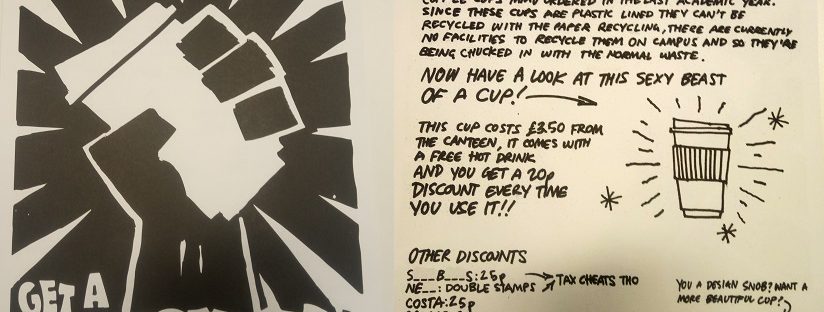Coffee cup recycling myth busted as UK’s greenest university MMU tackles the issue
- In the UK fewer than 1% of coffee cups are recycled
- 24% of people in UK wrongly believe coffee cups are recyclable
- MMU aims to tackle incorrect recycling of material in bid to retain UK’s greenest university title
Manchester Met, the UK’s greenest university, has pledged to cut the use of single-use paper coffee cups which contaminate recycling bins.
Coffee cups are fourth on the list of items most thought by people in the UK to be recyclable and many end up in the university’s paper recycling bins.
But because of their plastic lining and spillage from liquid, the entire contents of the bins have to be thrown away and cannot be recycled.
To counter this catering bosses at Man Met have launched a publicity campaign to persuade students and staff to buy a reusable cup and get a drinks discount into the bargain.
At the moment, 10,000 non-recyclable coffee cups are used on campus each year.

A report by the British Science Association reveals that due to the plastic inner lining in paper coffee cups, only one in 400 cups can be recycled at special recycling sites in the UK which have technology to split the paper from the plastic.
Ryan Waugh, MMU’s sustainability engagement co-ordinator, told NQ: “If coffee cups have been thrown in the bin with a little liquid leftover, the whole bin bag is deemed contaminated and thrown away as non-recyclable. Recycling plants don’t really want soiled or wet paper, as they cannot separate it out to make the paper into something else”.

Man Met was named the greenest university in the UK in 2017. It publishes annual statements reporting progress against specific green targets, including a commitment to recycle 60% of all waste by 2020. In 2016-17 the university recycled 48.6%.
Ryan said: “We’ve recently fitted a slot on the top of the bins so that only paper fits through, stopping people from putting coffee cups in them, as well as relabelling all the bins with what can and what can’t be placed inside.”
A lot of the coffee cups will end up in our paper bin, which is quite an issue for us because it ruins all the paper that goes in there
Serena Lee, 19, a university student said: “I like the idea that the university is tackling this; the extent to which this problem affects us should be viewed on a wider scale, I’m all for recycling, I think we should all care about our environment.”
MPs have proposed a ‘latte levy’ of 25p on disposable coffee cups as well as a possible ban by 2023 if they are not recyclable.
Many chain coffee shops offer a discount if a reusable cup is used instead of a disposable cup, something which MMU also offers.
Maya Stott, 31, works in Greggs, she said: “We offer to recycle any cup no matter what brand, you just need to bring your cup in store. Everybody should recycle as much as they can, and it’s great that we offer this service to our customers, it shows that we care.”
Asked whether these issues will affect the university’s standing as greenest university in the UK, Ryan said: “No, we’re judged on a lot of different categories, and we’re committed to tackling these concerns.”

In a press statement Professor Malcom Press, vice-chancellor of Manchester Metropolitan University, said: “Environmental change and sustainable living are amongst the greatest challenges that we face.
“We remain committed to address key issues including: reducing our carbon footprint through appropriate management of our estate.”
Greater Manchester Mayor Andy Burnham highlighted the issue of single use plastic such as coffee cups at the recent Manchester Green Summit, saying he hopes to help make a plastic-free Greater Manchester by 2020.


